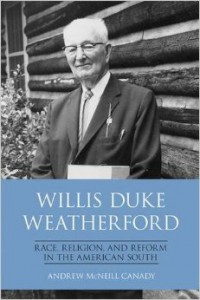 Averett University’s assistant professor of history and honors program director, Andrew McNeill Canady, recently published “Willis Duke Weatherford: Race, Religion and Reform in the American South,” a biography revised from his dissertation about a southern liberal man in the 1900s.
Averett University’s assistant professor of history and honors program director, Andrew McNeill Canady, recently published “Willis Duke Weatherford: Race, Religion and Reform in the American South,” a biography revised from his dissertation about a southern liberal man in the 1900s.
Averett will hold a book signing Wednesday, Jan. 25, at 7 p.m. in the multipurpose room at the University’s Student Center, 204 Woodland Dr. Canady will be there talking about the book and copies will be available for purchase.
Originally from Parkton, N.C., Canady has been interested in race relations since he was a child and during his time at Averett, he has become a local resource on the topic.
“Growing up, I was always troubled by people who were church-going but also maintained racist ideas and attitudes and are blind to this contradiction. And here in Danville, I have seen similar ways of thinking,” Canady said.
One of the reasons Canady wanted to study history was to try and figure out how people lived with themselves, by asking why they do what they did and what compromises they made for the time period they lived in.
“When people think about the past they tend to judge people on the standards of today, but you really need to judge them on the time period in which they lived and the standards they set for themselves,” said Canady.
Canady stresses the importance of this approach to his students in the classroom, and while writing his dissertation, he had the opportunity to meet Weatherford’s family, which really proved helpful in getting to know the man was he was writing about.
“I had a sense of wanting to finish it for them. I got to know them, they let me go to their home and they opened things up and shared with me for years – 10 years in all – that I spent writing and researching. He (Weatherford) had a daughter-in-law who was in her 80s that I got to know and who helped me. That’s one of the nice things, the relationships you build along the way,” Canady said.
opened things up and shared with me for years – 10 years in all – that I spent writing and researching. He (Weatherford) had a daughter-in-law who was in her 80s that I got to know and who helped me. That’s one of the nice things, the relationships you build along the way,” Canady said.
Canady wants to use the knowledge he gained through writing this book to help bring positive change in the community. He plans to continue to be a resource for race relations discussions in Danville and the surrounding area and use the mindset of Weatherford, that education will bring change over time.
“If people had a better sense of the history, if they understand it and knew more, I think they would do better, but it is a struggle,” Canady said.
Canady has a B.A. in history and religion from Wake Forest University and finished his M.A. and Ph.D. both in history from Rice University in 2011. Canady’s new book was published in the fall of 2016 by the University Press of Kentucky and is available for purchase. The following press release was issued by the company.
At the turn of the twentieth century, few white, southern leaders would speak out in favor of racial equality for fear of being dismissed as too progressive. Willis Duke Weatherford (1875–1970), however, defied convention as one of the first prominent white southern liberals to dedicate his life to reforming the South’s social system, eliminating violence and injustice through education, and opening a dialogue among the affected groups. His energetic efforts led to a rise in progressive action in the region, though at times his own beliefs prevented him from advocating for absolute racial equality. As a result, historians debate Weatherford’s legacy: Was he a forward-thinking supporter of human rights or merely a moderate paternalist?
In this comprehensive biography, Andrew McNeill Canady offers a reassessment of the influential educator’s life and work. Canady surveys Weatherford’s work with institutions such as the YMCA, Berea College, and Fisk University and illuminates his many efforts to foster dialogue among southerners of all races about religion, race relations, and Appalachia. He also examines Weatherford’s reluctance to challenge Jim Crow laws and the capitalist economy that contributed to the poverty of African Americans and the people of Appalachia, revealing the limitations that southern reformers faced and the difficult compromises they were forced to make.
During a career that spanned from the Progressive Era to the civil rights movement, Weatherford was involved in virtually every significant southern liberal effort of his time. Past research has focused primarily on Weatherford’s early work, but Canady’s study is the first to investigate the full trajectory of his life and career. This overdue biography makes a significant contribution to literature on the long civil rights movement and the development of southern liberalism.
